
MGIMO Review of International Relations
Scope & Guideline
Advancing Global Discourse, One Article at a Time.
Introduction
Aims and Scopes
- International Relations Theory and Practice:
The journal explores theoretical frameworks and practical applications within the realm of international relations, including geopolitical strategies, diplomacy, and statecraft. - Regional Studies and Global Governance:
A significant focus is placed on specific regions, such as Eurasia, BRICS, and the Middle East, examining their roles in global governance and international cooperation. - Historical Contextualization of Contemporary Issues:
The journal emphasizes historical perspectives, analyzing past events to provide insights into current international relations and foreign policy dynamics. - Sustainability and Energy Policy:
Research related to sustainable development, energy transitions, and environmental diplomacy is increasingly prominent, reflecting global concerns over climate change and resource management. - Cultural Diplomacy and Soft Power:
The role of culture in shaping international relations, including how media and public diplomacy influence perceptions and policies, is a key area of exploration. - Security Studies and Conflict Resolution:
The journal addresses security issues, including military cooperation, conflict resolution, and the impact of international crises on state behavior. - Migration and Humanitarian Issues:
There is a growing interest in migration, diaspora policies, and humanitarian diplomacy, reflecting the increasing complexity of global migration patterns.
Trending and Emerging
- Climate Change and Environmental Diplomacy:
An increasing number of articles focus on the intersection of climate change and international relations, exploring how environmental issues are reshaping diplomatic strategies and global governance. - Multipolarity and Global Governance:
The theme of multipolarity is gaining importance, with discussions on how emerging powers like BRICS are influencing the current world order and contributing to a more diversified global governance structure. - Impact of Digital Technologies on International Relations:
Research on the implications of digital transformation, including cybersecurity and information warfare, is on the rise, reflecting the growing importance of technology in shaping international relations. - Post-Pandemic Global Order:
The journal is increasingly addressing the consequences of the COVID-19 pandemic on global politics, exploring new trends in diplomacy, international cooperation, and global governance frameworks. - Humanitarian and Migration Policies:
Emerging themes include the challenges and opportunities presented by migration and refugee crises, as well as the role of humanitarian diplomacy in addressing these issues on an international scale.
Declining or Waning
- Cold War Diplomacy:
Research focusing on Cold War-era diplomacy and its historical implications has become less frequent, as contemporary issues and their immediate impacts take precedence over historical analyses. - Traditional Military Strategies:
The emphasis on conventional military strategies and historical conflict narratives appears to be waning, with a shift towards discussions around hybrid warfare and non-traditional security threats. - Bilateral Relations Studies:
There has been a noticeable decrease in papers solely focusing on bilateral relations between specific countries, as the journal increasingly favors broader analyses that incorporate multilateral frameworks and global trends. - Economic Sanctions as a Primary Tool of Foreign Policy:
The focus on economic sanctions as a primary mechanism of international relations is diminishing, possibly as scholars seek more comprehensive approaches that consider the multifaceted nature of global governance. - Historical Case Studies without Contemporary Relevance:
Studies that do not connect historical events to current international dynamics are becoming less favored, as the journal prioritizes research that offers actionable insights for present-day policymakers.
Similar Journals
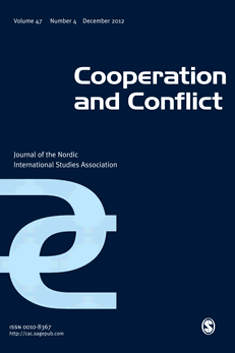
Cooperation and Conflict
Exploring the Dynamics of Global InteractionCooperation and Conflict is a premier academic journal published by SAGE Publications Ltd that serves as a vital platform for research in the fields of development, political science, international relations, and social sciences. With an impressive impact factor and a prestigious Q1 ranking in multiple categories including Political Science and Development, this journal stands out for its rigorous peer-reviewed articles that explore the complexities of conflict and cooperation in various global contexts. Since its inception in 1965, the journal has remained dedicated to advancing scholarly discussion and providing insights into social dynamics, making it an essential resource for researchers, professionals, and students alike. Although it does not offer open access, its significant contributions to the field and high citation rates underscore its importance in understanding and addressing contemporary societal challenges. For those keen to delve into critical discussions and findings that shape our understanding of cooperation and conflict, this journal is an indispensable asset.
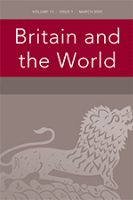
Britain and the World
Charting the Course of Britain's Historical InteractionsBritain and the World is a notable scholarly journal published by Edinburgh University Press, dedicated to advancing the field of history through comprehensive analyses of Britain's historical interactions with the world. Since its inception in 2009, the journal has fostered interdisciplinary research, examining themes ranging from colonialism to post-colonial studies, as well as the socio-political dynamics that shaped Britain's global influence. With no open access model currently available, Britain and the World provides a robust platform for scholars dedicated to investigating the complexities of British history in a global context. Although currently categorized in the fourth quartile (Q4) of history journals, its commitment to quality scholarship and its strong editorial oversight promises to enhance its stature in academia, making it an invaluable resource for researchers, professionals, and students seeking to deepen their understanding of Britain's role in global affairs. For those interested in contributing to the discourse or exploring its published works, the journal is based in the United Kingdom at The Tun-Holyrood Rd, 12 2F Jacksons Entry, Edinburgh EH8 8PJ, Scotland.
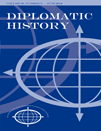
DIPLOMATIC HISTORY
Exploring the Intersections of History and DiplomacyDIPLOMATIC HISTORY, published by OXFORD UNIV PRESS, is a leading academic journal in the field of diplomatic studies, boasting an impressive Q2 ranking in History and a notable 84th percentile among the top arts and humanities journals as per Scopus rankings. Since its inception in 1977, this esteemed journal has consistently provided a scholarly platform for rigorous research and innovative discussions surrounding the dynamics of international relations, statecraft, and political diplomacy. With contributions from esteemed historians and emerging scholars alike, DIPLOMATIC HISTORY endeavors to examine historical contexts that shape contemporary diplomatic practices, fostering a deep understanding of past and present geopolitical landscapes. While this journal does not currently offer Open Access, it remains a vital resource for researchers and professionals striving to enhance their expertise in the complex interplay of history and diplomacy.
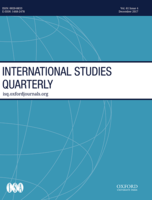
INTERNATIONAL STUDIES QUARTERLY
Illuminating the Complexities of Global ChallengesINTERNATIONAL STUDIES QUARTERLY, published by OXFORD UNIVERSITY PRESS, is a premier scholarly journal in the domains of Political Science and International Relations. With an esteemed Q1 ranking in both fields as of 2023, this journal stands out as a significant contributor to the academic discourse on global issues, diplomacy, and the socio-political challenges facing international systems. Covering a spectrum of interdisciplinary research since its inception in 1978, it provides a vital platform for researchers, practitioners, and students alike to engage with contemporary theoretical frameworks and empirical studies. Although it operates under a traditional subscription model, its high visibility in the academic community ensures that it reaches a wide audience. With a Scopus ranking that positions it in the top percentile of its fields, INTERNATIONAL STUDIES QUARTERLY remains essential for anyone seeking to deepen their understanding of the complexities of international relations.
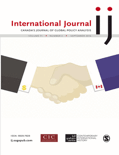
INTERNATIONAL JOURNAL
Illuminating the Path of Political TheoryWelcome to the International Journal, a premier academic publication in the fields of Political Science and International Relations, published by SAGE Publications Ltd.. With a distinguished history dating back to 1981, this journal has become a vital resource for scholars and practitioners worldwide, offering insights into complex global issues and fostering critical discourse. As of 2023, it proudly holds a Q2 category ranking, reflecting its influential position within the academic community, as evidenced by its Scopus ranking of #288 out of 706 in the related fields. The journal provides non-open access articles, ensuring high-quality peer-reviewed content that is accessible through institutional subscriptions. By maintaining rigorous editorial standards and promoting interdisciplinary research, International Journal continues to contribute significantly to the evolution of political theory and international studies, making it essential reading for anyone committed to understanding the dynamics shaping our world today.
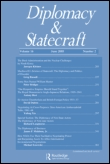
Diplomacy & Statecraft
Engaging with the pivotal issues of diplomacy and statecraft.Diplomacy & Statecraft, published by Taylor & Francis Inc, is a highly regarded journal in the realms of History, Political Science, and International Relations. Since its inception in 1990, this journal has played a pivotal role in the scholarly exploration of diplomatic practices and their implications for statecraft. With an ISSN of 0959-2296 and an E-ISSN of 1557-301X, it provides a rigorously peer-reviewed platform for academics and practitioners aiming to contribute to the understanding of global politics. Although not an Open Access journal, it maintains a commendable impact, evidenced by its Scopus rankings—positioned in the 69th percentile for History and engaging discussions on significant political themes. Its importance is underscored by its recent categorization in Q3 and Q4 quartiles, making it a critical resource for researchers and students interested in the complex dynamics of diplomacy and international relations. With a commitment to publishing compelling and insightful articles, Diplomacy & Statecraft continues to foster academic dialogue and enrich our understanding of the strategic maneuvers that shape our world.

Turkish Policy Quarterly
Navigating the Complexities of International RelationsTurkish Policy Quarterly, ISSN: 1303-5754, is a distinguished journal published by TURKISH POLICY QUARTERLY, dedicated to offering critical insights and analyses in the realms of policy studies, international relations, and socio-economic development. Housed in the vibrant city of Istanbul, Turkey, this journal serves as a platform for researchers, practitioners, and students to explore emerging issues and share rigorous assessments of policies impacting Turkey and the wider region. Though currently not an open-access publication, its rich content is pivotal for anyone aiming to understand the intricacies of policy-making at both national and international levels. With a strong commitment to scholarly excellence, Turkish Policy Quarterly enriches the discourse by providing a blend of theoretical approaches and practical implications, catering to a diverse readership eager to engage with pressing global challenges.
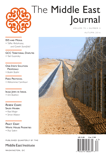
MIDDLE EAST JOURNAL
Exploring the Complexities of the Middle EastThe Middle East Journal, published by the esteemed Middle East Institute, serves as a vital platform for scholarly discourse on the complexities of the Middle East, encompassing rich analyses in the fields of Sociology, Political Science, and Geography. With a legacy dating back to 1976, this journal continues to shape contemporary dialogues, offering rigorous research and insights that influence policy-making and academic studies alike. Academic readers will note its Scopus rankings, positioning it within the lower quartiles of Geography, Planning and Development and Sociology and Political Science, reflecting an opportunity for growth and increased visibility within these fields. Although the journal is not open access, it remains an essential resource for those aiming to enhance their understanding of the historical and current dynamics of the Middle East. The Middle East Journal stands as a testament to the region's complex socio-political landscape and offers a comprehensive lens for both established scholars and aspiring researchers.

Revista UNISCI
Exploring Critical Issues in an Interconnected WorldRevista UNISCI is a distinguished open-access journal published by UNIV COMPLUTENSE MADRID, SERVICIO PUBLICACIONES, dedicated to advancing the discourse in the fields of Political Science and International Relations. Since its inception in 2005, it has established a platform for emerging scholars and seasoned researchers alike to share innovative ideas and findings. With an E-ISSN of 2386-9453, Revista UNISCI is accessible to a global audience, facilitating knowledge dissemination in an increasingly interconnected world. The journal has been categorized in Q4 quartile for 2023, highlighting its relevance in the competitive landscape of academic publishing, while its Scopus rank of 566 out of 706 positions it among the prominent voices in the discipline. As the journal enters its converged years from 2015 to 2024, it aims to foster interdisciplinary dialogue and contribute to ongoing research debates, ultimately enriching the academic community’s understanding of critical global issues.
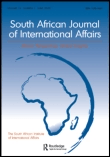
South African Journal of International Affairs-SAJIA
Connecting Researchers to Contemporary Global IssuesThe South African Journal of International Affairs (SAJIA), published by Routledge Journals under Taylor & Francis Ltd, is a leading academic publication dedicated to advancing the study of political science and international relations within the African context. Since its inception in 1993, SAJIA has distinguished itself in the academic community, achieving a Q3 ranking in 2023 among its peers, reflecting its commitment to high-quality research and scholarly discourse. With a current Scopus rank of #285 out of 706 within its field, SAJIA provides a platform for researchers, professionals, and students to engage with contemporary global issues, particularly those pertinent to Africa and its interactions on the world stage. Although it does not operate on an open access model, the journal's rigorous peer-review process ensures that published articles contribute significantly to the academic corpus. The journal's scope encompasses a wide array of topics, positioning it as an essential resource for anyone interested in the dynamics of international affairs.